In this article:
Onions contain a plethora of nutrients and bioactive compounds that can do wonders for your hair. These include vitamin C, folate, vitamin B6, and potassium, all of which exert different therapeutic effects.
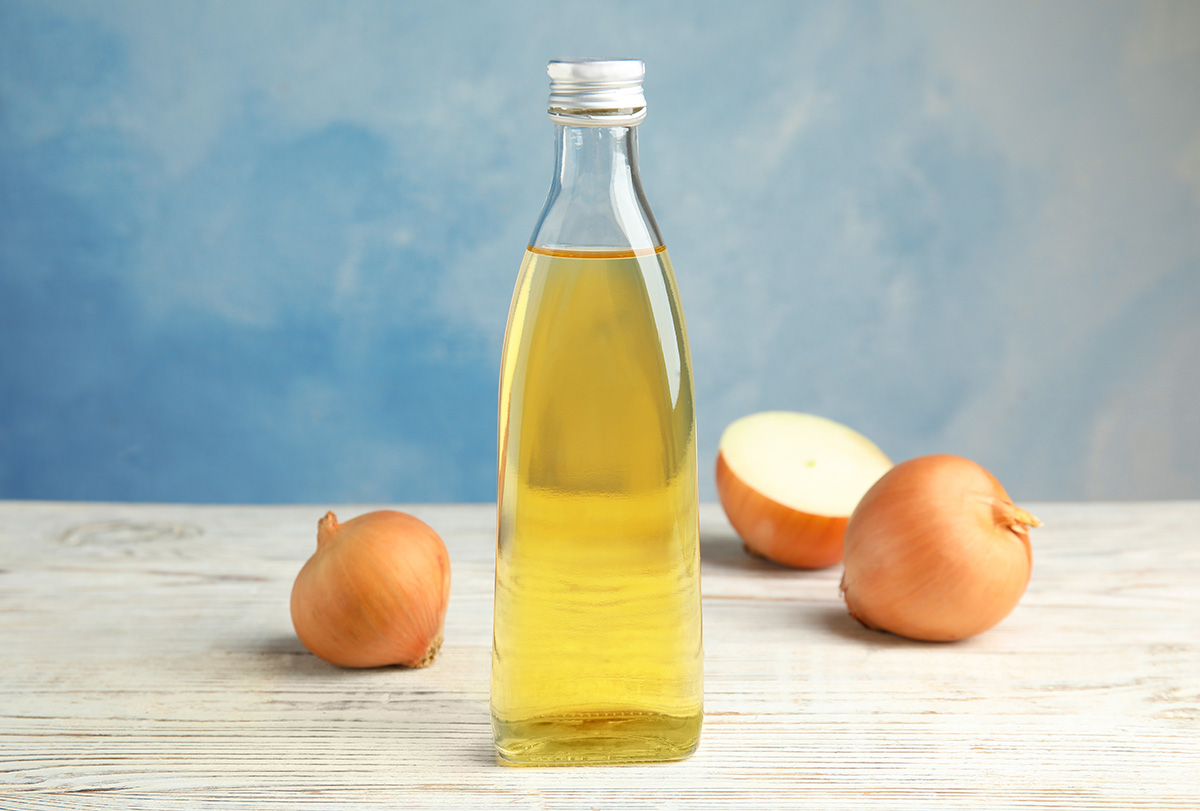
Onions are a prized hair care ingredient that can strengthen your hair roots, promote fast and healthy hair growth, and improve the overall quality, texture, and appearance of your tresses. They are credited with potent antioxidant, anti-inflammatory, and antimicrobial properties that can help repair hair damage and avert scalp infections, among other hair benefits.
The oil extracted from onions contains concentrated amounts of its healing components, making it a great hair care remedy and is also considered good for hair growth. This article brings to light some important benefits of onion hair oil and how you can use it.
Benefits of Onion Hair Oil
Using onion hair oil can provide you with the following hair care benefits and help ensure healthy hair growth.
1. May help with hair loss
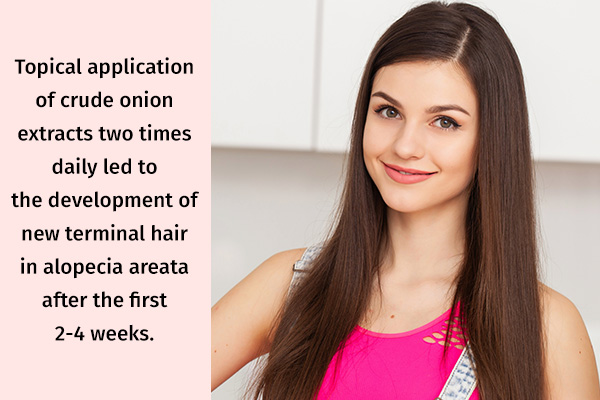
Alopecia areata is an autoimmune disorder wherein your body wrongly perceives the hair follicles in your scalp as a foreign threat and mounts an immunological attack against them. Each hair is rooted in a hair follicle, through which it receives nutrition, oxygen, and new hair cells to grow long and strong.
When the hair follicle is destroyed via this immunological dysfunction, the hair rooted in it eventually falls out. This condition is typically characterized by the appearance of small, round bald patches on the scalp, but it can lead to complete baldness as well.
Alopecia areata is neither contagious nor life threatening, and it can affect people of all ages and genders.
How onion hair oil helps
One study demonstrated that topical application of crude onion extracts two times daily led to the development of new terminal hair in alopecia areata after the first 2 weeks, with 73.9% of the patients experiencing hair regrowth after 4 weeks and 86.9% of the patients at six weeks. Based on these findings, crude onion extracts can be considered as a potentially effective topical therapy for alopecia areata. (1)
The exact mechanism through which topical onion juice helps repair alopecia areata is not clearly understood, but it may have something to do with the sulfur and phenolic compounds found in it.
It is suggested that these compounds induce a form of irritant contact dermatitis, which, in turn, stimulates hair regrowth through a process called antigenic competition. (2)
2. May help prevent premature graying of hair
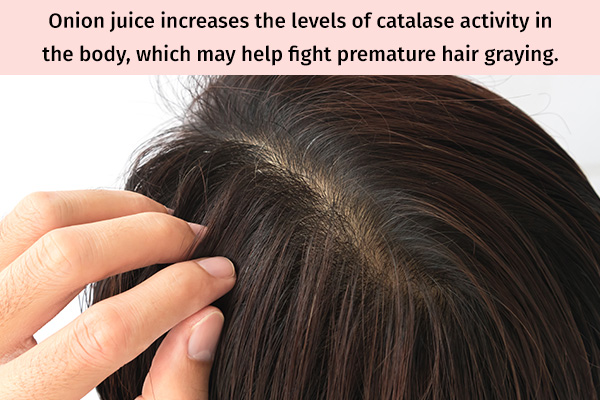
Your hair gets its color from the same compound that determines your skin tone; melanin. The cells responsible for producing this pigment are called melanocytes. The melanocytes located inside your hair follicles tend to produce less and less melanin as you grow older. The lack of melanin makes your hair lose its color, resulting in grays.
While age-related hair graying is a natural process that cannot be avoided, certain factors can accelerate it, including genetics, sun damage, stress, poor diet, negligent hair care, and environmental pollution.
Graying of hair at a relatively young age is known as premature graying, but the standard age to define this phenomenon varies from one ethnicity to another:
- Before 20 years of age in Caucasians
- Before 30 years of age in Africans
- Before 25 years of age in Asians
How onion hair oil helps
Onion juice increases the levels of catalase activity in the body, which may help fight premature hair graying.
Gray hair is associated with high hydrogen peroxide levels and low catalase levels within the hair follicles. Increased concentration of hydrogen peroxide can lead to oxidative stress within the follicles, which can lead to the graying of hair. (3)
3. Fights off infections
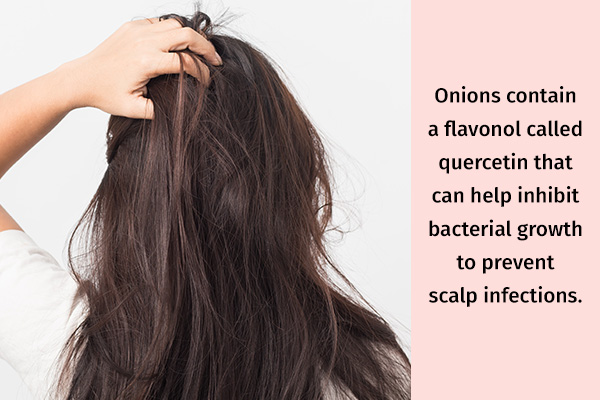
Fungi or bacteria that invade hair follicles or ruptured scalp skin can proliferate rapidly and give rise to an infection that encompasses your entire scalp and can spread to the hair shafts.
People with skin conditions such as psoriasis and eczema are more at risk since the structural integrity of their skin is already compromised. Some common examples of such infections include folliculitis and impetigo, which are caused by bacterial overgrowth, as well as dandruff and ringworm, which are fungal in nature.
How onion hair oil helps
Research suggests that onions may exhibit fungicidal activity against major pathogenic groups such as Candida, Malassezia, (4) and dermatophytes, (5) which are known to cause scalp/hair infections.
The fungicidal activity can be traced back to three saponins found inside the bulb of white onions, namely, ceposide A, ceposide B, and ceposide C. The antifungal effects of these saponins tend to increase when concentration increases, but ceposide B was found to be the strongest among them. (6)
Onions also contain a flavonoid called quercetin, which may inhibit bacterial growth to prevent infections. (7) Plus, red onions are enriched with sulfur, which can help kill head lice and even prevent future infestations when used periodically.
4. Conditions the hair naturally
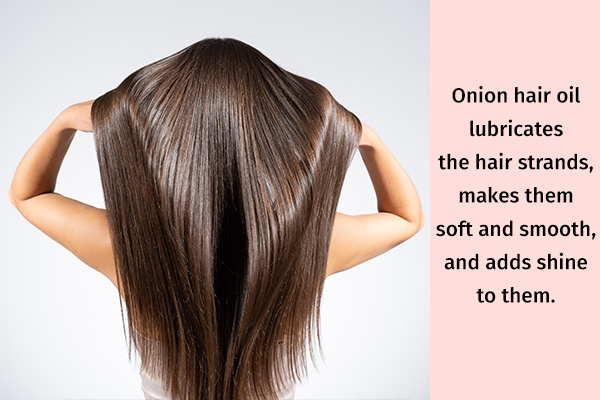
Shampoos are specifically formulated to remove dirt, sweat, oil, dead cells, environmental pollutants, and hair product residue that collect on your hair and scalp.
If you don’t wash your hair regularly, these impurities will build up over time and settle inside your follicles, clogging. Plus, unclean scalp and hair are also more likely to invite microbial overgrowth, leading to infections. So, the importance of regular hair washing with a good-quality shampoo cannot be stressed enough.
But the deep-cleansing effect of shampoos removes not only the impurities but also the inherent lipids from your hair. Shampoos contain chemicals in the form of lathering agents and added fragrances that strip the moisture from your hair, making them dry, rough, and frizzy. This is why it is recommended to use a conditioner after shampooing to restore the lost moisture to your hair and seal it in.
Many conditioners available are sold today, but one of the cheapest yet highly effective options is onion oil. This healing potion can deeply hydrate, nourish, and repair your hair, making them soft, bouncy, and voluminous.
How onion hair oil helps
Onion hair oil lubricates the hair strands, makes them soft and smooth, and adds shine to them. It also protects the hair shafts from damage.
An advantage of using onion hair oil over any store-bought conditioner is that it can also be used to massage the scalp, which helps improve microcirculation within the hair follicles to facilitate better hair growth. (8)
Other Benefits of Onion Oil
There are other ways in which onion oil can enhance your hair health. A considerable number of general users vouch for the following hair benefits of onion oil, although these claims are yet to be verified through proper scientific studies.
- Onion oil is rich in sulfur, which may help prevent hair breakage, split ends, and hair thinning.
- Onion oil’s acidity helps maintain a healthy scalp pH, which is essential for warding off scalp infections that thrive in alkaline environments.
- Onion oil improves hair texture.
DIY Onion Hair Oil for Hair Growth
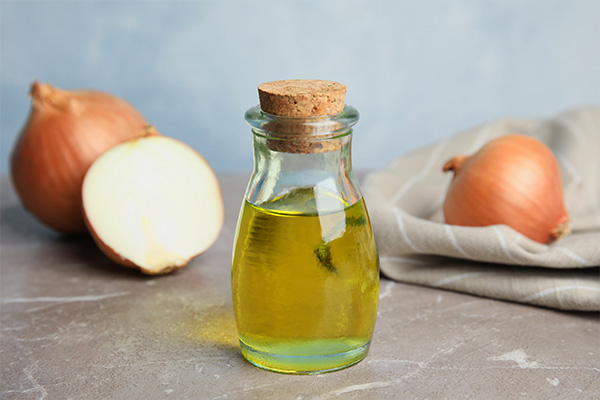
Onion hair oil can either be bought at stores or can be prepared at home.
How to make onion oil
The easy way is to simply dilute onion essential oil with a carrier oil such as coconut oil. But if you want to prepare it from scratch, follow these steps:
- Take a few peeled onions and cut them in halves.
- Put a few onion pieces into a blender to make onion juice.
- Grind the remaining onions to make a paste.
- Pour some coconut oil along with the onion juice and paste into a saucepan, and stir all the ingredients together.
- Turn on the burner, and let the mixture come to a boil.
- After that, lower the heat and let it simmer, stirring continuously until the oil separates.
- Turn off the burner and let the pan cool down for a couple of hours.
- Pass the contents of the pan through a muslin cloth to strain the onion oil.
- Store this oil in an airtight container and use it as required.
How to use onion oil
There are two ways you can use onion oil to pamper your hair:
- Normal head massage: Pour a few drops of pure onion oil directly in your palms and gently massage your scalp with it using gentle circular motions of your fingers for 15–20 minutes. Let it sit for 3–4 hours before rinsing it off with a mild sulfate-free shampoo.
- Hot oil treatment: Add a few drops of onion oil in a carrier oil (such as almond or olive oil), and heat the mixture to a lukewarm temperature before applying it all over your hair and massaging it into your scalp. The warmth of the oil will help open up your follicles for better absorption and will stimulate blood circulation in the scalp. Let your hair and scalp soak in the oil mix overnight. Rinse it off the next morning with a mild sulfate-free shampoo followed by a conditioner application.
Note: Onion oil starts losing its potency 6 months after production, so best to utilize it before that time.
Caution: Using onion oil or onion juice for the hair is mostly safe, but you should still conduct a patch test first to rule out an allergic reaction. Some people have reported experiencing erythema and slight itching after applying onion oil. One way to minimize the possibility of such adverse reactions is by diluting the onion oil with a carrier oil such as olive oil. Moreover, certain medications such as aspirin can make your skin increasingly sensitive to onion oil, which is why it’s best to avoid using them together.
What Kind of Onion Is Best to Make Oil for Hair?
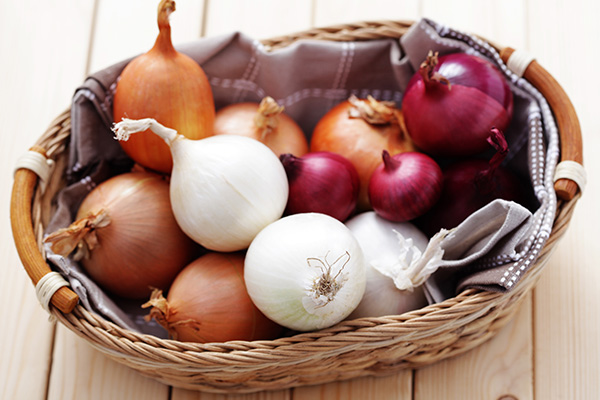
Both red and white onions have their own nutritional merits and healing properties, so the oil derived from either of them is likely to benefit your hair health, just in different ways.
Overall, red onions are more richly endowed with antioxidants and flavonoids, making their overall nutritional value higher than that of white onions. On the other hand, white onions have a greater reserve of sulfur, which is a boon for your hair in many ways, especially for fighting hair fall.
Final Word
Onion oil is a cheap, safe, and effective ingredient that can significantly upgrade your hair care regimen. It strengthens, conditions, protects and repairs your hair for improved texture, volume, and appearance.
The only downside is its strong off-putting smell, which can stick around even after shampooing. But the pros outweigh the cons. You may want to use a highly fragrant shampoo to banish the odor, but best if you don’t. This is because such shampoos contain chemical fragrances that can dehydrate and damage your hair over time.
A better strategy would be to use the oil in small amounts or mix it with other oils to dampen the smell. Also, you have to use this remedy consistently for weeks to get noticeable results. If you expect a remedy to produce drastic improvement with only a few uses, you are only setting yourself up for disappointment.
Read Further on Onion and Hair Health
Here are a few more onion and hair related articles in this series:
- Was this article helpful?
- YES, THANKS!NOT REALLY


